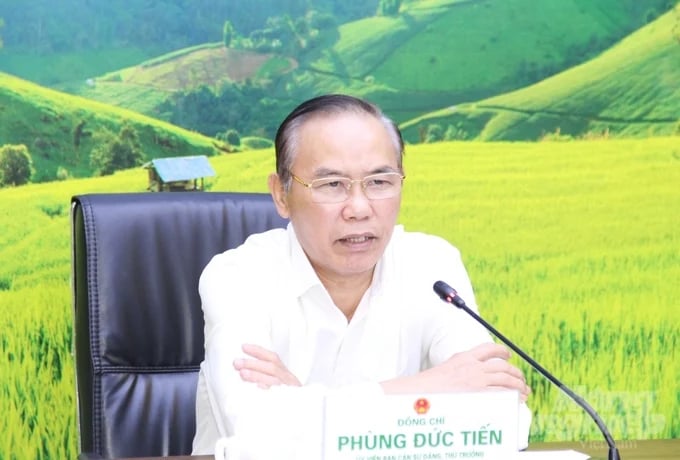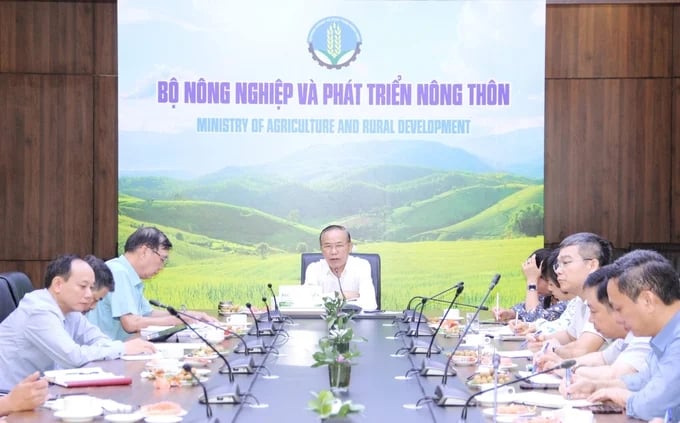June 19, 2025 | 04:11 GMT +7
June 19, 2025 | 04:11 GMT +7
Hotline: 0913.378.918
June 19, 2025 | 04:11 GMT +7
Hotline: 0913.378.918
In the first half of the year, the Department of Science, Technology, and Environment has diligently followed its assigned tasks, enhancing coordination with units within and outside the Ministry to effectively execute the tasks assigned by the Ministry of Agriculture and Rural Development. This included the development of legal documents, projects, strategies, and programs, as well as planning for science, technology, and environment initiatives set to begin in 2025.

Deputy Minister Phung Duc Tien emphasized that the Department of Science, Technology, and Environment must adhere to the principle of ‘synchronous quantity-quality transformation’ when developing science and technology tasks. Photo: Trung Quan.
In the first half of 2024, the Department led and directed units to continue implementing 315 ministerial-level science and technology (S&T) and environmental tasks. These tasks focused on high-quality plant, animal, and aquatic varieties; processing and preservation technology to reduce post-harvest losses; the development of high-tech and organic agriculture; the preservation and restoration of genetic resources to support the development of local specialty plant and animal varieties; and the protection of the agricultural production environment. Additionally, the Department evaluated and accepted 52 S&T tasks concluding in 2024, recognizing the results of completed tasks (10 S&T tasks, 6 potential).
Notably, from research results in 2023 and the first half of 2024, the Ministry has recognized 42 new varieties, 14 technical advancements, 12 patents, 13 technological processes, useful solutions, and 4 technical manuals for production transfer.
In addition, the Department has carried out 10 tasks focused on conserving the genetic resources of agricultural plants, microorganisms for cultivation, plant protection, forestry plants, animal husbandry, veterinary microorganisms, and aquatic products. This includes restoring the genetic resources of the indigenous Ri6 durian through rootstocks and grafting, producing commercial durian varieties, and restoring the genetic resources of Bao Yen taro, Tua Chua taro, and Hua Pang taro (Moc Chau). Moreover, efforts are underway to develop a restoration process and map the geographical indications of Lai Chau ginseng, as well as to restore genetic resources and build a model for producing catfish breeds.
Regarding agricultural extension work, the communal projects group has provided seeds, materials, technical training, supervision, direction, and monitoring of evaluation indicators. The number of implemented models is estimated at 126 crop models, 31 livestock models, 46 fishery models, 36 forestry models, and 5 mechanization models. The acceptance of 56 central agricultural extension projects has been completed.
In terms of the construction, appraisal, announcement, issuance, and organization of national standards and technical regulations, by June 2024, the Agriculture and Rural Development sector had established 1,407 TCVNs (Vietnamese Standards) and 107 QCVNs (Vietnamese Technical Regulations). Agricultural materials management included 448 TCVNs and 35 QCVNs. Regarding intellectual property, the Department received 70 applications, granted 77 certificates, suspended 75 certificates, restored the validity of 3 certificates, and recorded the transfer and re-granting of 2 plant variety protection certificates.
For the remaining six months of the year, the Department of Science, Technology, and Environment will continue to implement the Strategy for Science and Technology Development and Innovation in the Agriculture and Rural Development Sector for the period 2021-2030. This includes the program for developing research and producing varieties to serve the restructuring of the agricultural sector for the period 2021-2030, with the highest priority given to producing high-quality varieties. Additionally, the Department will deploy tasks related to the Project on science development, application, and technology transfer to promote the circular economy for the period 2023-2030.

Deputy Minister Phung Duc Tien chaired the conference. Photo: Trung Quan.
Furthermore, the Department will synchronously implement solutions outlined in the Science and Technology Development Strategy to enhance the research level, transfer, and application of science and technology. This includes addressing key stages of agricultural development, focusing on key export products, and developing high-yield, high-quality varieties with disease resistance and adaptability to climate change. Emphasis will also be placed on advancing post-harvest processing and preservation technology, alongside fostering the development of the science and technology market and encouraging enterprises to invest in high-tech agricultural zones and regions.
During the conference, Deputy Minister of Agriculture and Rural Development Phung Duc Tien underscored that the Department of Science, Technology, and Environment must embrace the principle of ‘synchronous quantity-quality transformation’ when developing science and technology tasks. While quantity fulfills production needs and requirements, the quality of science and technology topics, projects, and tasks must continuously improve. Specifically, when developing these tasks, it is crucial to build upon proven content as a foundation while significantly promoting novelty and creativity. Simultaneously, efforts should focus on advancing science and technology tasks to resolve pressing production challenges such as the aging agricultural labor force and expanding markets, crops, and disease management.
Deputy Minister Phung Duc Tien also highlighted the significance of the country's valuable gene bank, which serves as a crucial breeding resource. Therefore, amidst the rapid development trends of industrialization, modernization, and the promotion of green and sustainable production, the Department of Science, Technology, and Environment must review, survey, and collect valuable gene sources across all sectors. This approach will integrate conservation efforts with robust applications of science and technology to develop new, distinctive, and specialized breeds.
Translated by Quynh Chi

(VAN) To address plastic pollution, closing the plastic recycling cycle will bring significant economic and environmental benefits.

(VAN) According to the Binh Thuan Department of Industry and Trade, in the first five months of 2025, Binh Thuan's dragon fruit export turnover increased by 20.65% compared to the same period last year.

(VAN) EU countries on Thursday gave final approval to new tariffs on fertilizer imports from Russia, a move aimed at cutting off revenue that could support Moscow’s war in Ukraine, despite concerns from European farmers.

(VAN) The working delegation from the Ministry of Agriculture and Environment conducted an important trip to the Netherlands to strengthen strategic partnerships and sustainable development in the agricultural sector.

(VAN) The letter ‘A Plea from the Ocean’ not only evokes emotion but also awakens the human conscience to the responsibility of protecting life on Earth.

(VAN) The Department of Agriculture in South Africa has announced the country’s first mass vaccination of poultry to prevent local birds from contracting avian influenza.

(VAN) Establishment of the Mekong Delta Regional Agricultural Linkage Center, aiming for a closed value chain, deep processing, trading platforms, and international market connectivity.